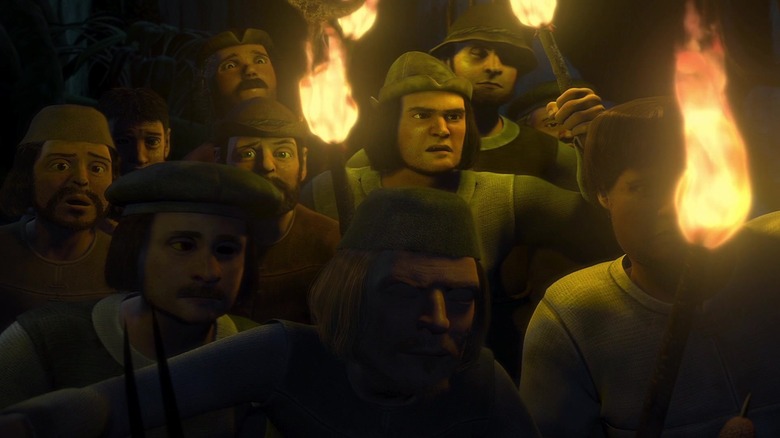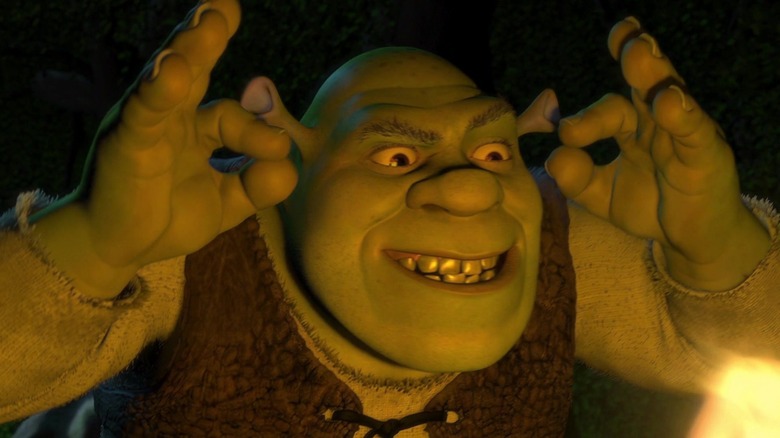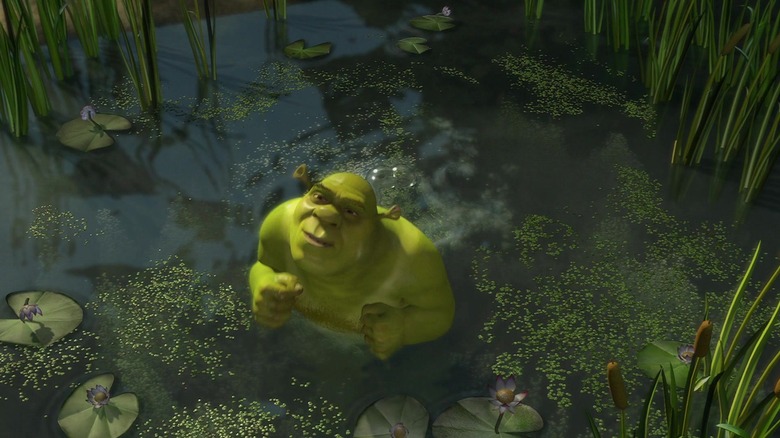Dreamworks Used To Punish Animators By Forcing Them To Work On A Classic Movie
We may receive a commission on purchases made from links.
Mimi Leder's 1997 actioner "The Peacemaker" was the first movie released by the then-nascent DreamWorks Pictures. The studio rushed multiple high profile films into theaters immediately thereafter, dropping Steven Spielberg's Oscar-bait drama "Amistad" and Gore Verbinski's stylish kiddie flick "Mouse Hunt" before the year was out. DreamWorks soon proved to be a formidable player in mainstream animation as well, unveiling "Antz" and "The Prince of Egypt" in the late months of 1998. 2000 was also a good year for its animation department, with DreamWorks releasing both "The Road to El Dorado" and Aardman Animations' "Chicken Run."
Then, in 2001, DreamWorks Animation released "Shrek," a pointedly anti-Disney satire based on the picture book by William Steig. "Shrek" featured endless cheeky send-ups of fairy tales, and audiences ate it up. The first "Shrek" was a huge box office hit and spawned a massive entertainment franchise that lasts to this day. Indeed, a whole generation has grown up watching "Shrek," and its many sequels are now considered classics. The property became so lucrative that Disney itself started to imitate its satire, as the studio's own "Frozen" had some of the same anti-Disney sentiment that "Shrek" wrought.
No one could have predicted just how popular "Shrek" would become, least of all the higher-ups at DreamWorks. Indeed, according to Nicole LaPorte's book "The Men Who Would be King: An Almost Epic Tale of Moguls, Movies and a Company Called DreamWorks," "Shrek" was, once upon a time, considered a punishment by the studio. The hot ticket production in the late 1990s was "The Prince of Egypt." If you messed something up while animating that film, the DreamWorks honchos would demote you down to the "Shrek" production. There's certainly an irony to that, as "Shrek" made far more money than "The Prince of Egypt" ever did.
If you messed up on The Prince of Egypt, you got demoted to Shrek
To remind readers, "The Prince of Egypt" was a full-blown musical re-imagining of the Book of Exodus boasting an all-star cast that included Val Kilmer as Moses and Ralph Fiennes as Rameses, plus Michelle Pfeiffer, Patrick Stewart, Helen Mirren, Jeff Goldblum, Sandra Bullock, Danny Glover, Steve Martin, and Martin Short. A-listers like that weren't regularly gathered for animated features yet. "The Prince of Egypt" was also a high-profile prestige picture intended to combat Disney's dominance of the animation market at the time during the famous Disney Renaissance. A lot of time and energy went into the film, and it ended up snagging two Oscar nods, winning for Best Song. This was a few years before the Best Animated Feature Oscar was introduced, otherwise it would've been a shoo-in.
"Shrek," meanwhile, was a silly comedy about an ogre. While it also had an all-star cast (including Mike Myers, Eddie Murphy, John Lithgow, and Cameron Diaz), it was regarded as the "lesser" film. Indeed, an animator (who preferred to remain anonymous) spoke to LaPorte, explaining that "Shrek" was used as a punitive measure:
"It was known as the Gulag. [...] If you failed on 'Prince of Egypt,' you were sent to the dungeons to work on 'Shrek.'"
It seemed that no one wanted to be "Shreked." It should also be remembered that "Shrek" was originally envisioned as being more disgusting than it became. Like Steig's book, Shrek was meant to be the grossest creature in the world. He married the second grossest creature, and they had revolting offsprings. No one wanted to work on a movie like that. Also, it was a computer-animated film, which many traditional animators felt was beneath them.
Shrek started out even grosser
As the New York Post noted in 2010, even the "cleaned up" version of "Shrek" was still considered too gross for DreamWorks' animators. Recall that the titular character was an ogre who lived in a bog and bathed in mud. In the opening minutes of the film, Shrek exits an outhouse and then gets into a swamp where he assertively breaks wind, killing the nearby fish. It feels tame in retrospect, but a major studio release starting with poop and fart gags was a risk at the time. The movie's co-director, Vicky Jenson, recalled feeling antsy when "Shrek" premiered at Cannes, saying "Here we are, sitting in tuxedos and evening gowns, wearing borrowed jewels, and everyone's watching Shrek take a poot in the water."
Even DreamWorks co-founder Jeffrey Katzenberg, who was also the head of DreamWorks' animation department back then, remembered thinking that "Shrek" was going to inspire walk-out and outrage at its premiere:
"For the first 10 minutes — nothing. [...] My heart was thumping, my forehead was breaking out in a sweat. I said to myself, 'They're going to burn the place down.'"
Instead, "Shrek" became DreamWorks' biggest hit. A sequel was quickly put into production, and "Shrek 2," released in 2004, becoming that year's highest grossing film at the global box office. The franchise also gave rise to spin-off films about Antonio Banderas' breakout character from "Shrek 2," Puss in Boots, as well as a high-earning Broadway musical. Shrek has additionally turned up in at least 12 video games since then, along with amusement-park-only attractions. If Shrek was supposed to be the grossest creature alive, he has been turned into a family-friendly, smiling, friendly companion. Shrek may've farted in a bog, but that was no bad thing.


